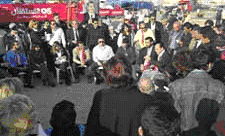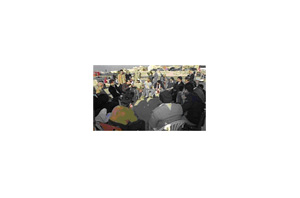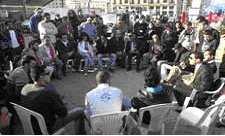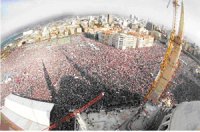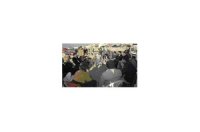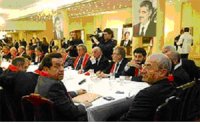
Lebanon in 2005, illustration of citizens responsibility
por Ziad MAJED
Temas largos ligados:
Citizenship .
Responsabilidade social .
This is a narrative report, with some photos related to the historical moments that we created and witnessed in Lebanon in the spring, and that were the illustration of what can citizen’s responsibility mean.
The report covers the events and the activities we did under the philosophy of the charter.
Introduction
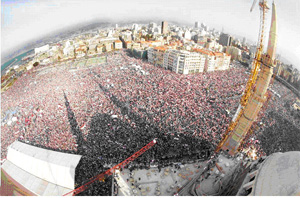
- March 14th, 2006, in the center of Beyrouth
Lebanon lived this year historical events that changed the political conditions established since 1991, when the war ended and the Syrian regime controlled the whole country.
The political dynamics that started in 2000 (after the withdrawal of the Israeli troops that occupied the southern parts of the country for 22 years – an event that ended the “official justification” of the Syrian military presence in Lebanon) took different speeds and culminated in September 2004 in a national campaign against the violation of the constitution to renew the mandate of the Syrian appointed Lebanese president.
The Syrian regime reacted to this campaign in February 2005, and it is widely believed that it ordered its Lebanese allies to assassinate PM Hariri.
The brutal crime in which Hariri and 19 other people were killed launched an unprecedented wave of anger in the country, and pushed all opposition groups to unify and to call for an independence upraising (Intifada).
Political parties and movements, from the right, the center and the left met and negotiated a political platform with 4 major priorities:
- the full withdrawal of the Syrian troops and its secret services from Lebanon,
- the resignation of the pro-syrian Lebanese government,
- an international investigation in the assassination of PM Hariri,
- the reconstruction of the Lebanese democratic state and the dismantling of the Lebanese security apparatus that the Syrians built in Lebanon.
The upraising called for by these parties and groups consisted of mobilizing citizens from all political, communitarian and social backgrounds to take in charge their responsibilities and their destiny for the first time in Lebanese history in order to achieve the 4 (above mentioned) priorities.
Citizens and political movements organized daily (for 4 months) in Beirut and other regions peaceful demonstrations, sit-ins, debates and cultural activities calling for the independence of the country and the beginning of a democratic process to build a modern state.
Beirut witnessed in February, March, April and May what can be considered as a political and social spring.
The biggest demonstration ever took place in March 14, when more than 1 million Lebanese marched to the center of Beirut, a center destroyed during the war in rebuilt in the last decade. The demonstration gathered around 60% of the active population of the country, a world record according to BBC, AFP and different credible sources.
Arab satellites and international media were covering the events, and many arab intellectuals and progressive movements hoped what happened in Beirut will get reproduced in their cities and countries.
Students, activists, teachers, private sector employees, intellectuals and politicians worked together and produced a new experience in the country. Dialogue and peaceful ways were the only tools used and a democratic laboratory was under construction.
A camp gathering young students from all regions and political affiliation was built in the center of Beirut and thousands of people spent their days and nights in it. In this camp, discussion circles were regularly organized, and massive distribution of brochures and documents took place.
During these days, the notion of responsibility was among the most commonly used notions.
In June, after the opposition alliance won its battle, and 3 out its 4 priorities were fulfilled, the alliance between its components ended, and a new political moment with new alliances started in the country.
Communitarism that was weakened during the upraising gained spaces again due to the parliamentary elections and the tough competition between factions and groups.
At the same time, assassinations and explosions targeting intellectuals, journalists, and citizens (and widely believed to be Syrian regime’s terror and revenge acts) brought the country back to some of its old memories related to the war, and created economic stagnation.
The current government made lots of efforts to control the situation, but the national stability is still fragile.
Nowadays, Lebanon is waiting for the UN investigation report on the assassination of PM Hariri. The report will open definitely a new era in the region, and will unveil killers and terrorists who committed in Lebanon hundreds of assassinations and were never punished.
Activities related to the Charter
To profit from this context, and to disseminate the Charter and link the message it contains to a huge amount of people, no activities were based directly on the text of the Charter itself, even though it was widely distributed (more than 15000 copies). What we did was to organise a series of dialogue circles on the concept of citizens’ responsibility in the martyr’s square in Beirut, and in youth camps in the south and the north of the country (see photos).
In addition, many discussion circles on the responsibility of Arab intellectuals after the assassination of journalist and historian Samir Kassir and political leader Georges Hawi, were organized as well in which notions of solidarity, commitment, honesty and determination were in the heart of all interventions.
|
|
|

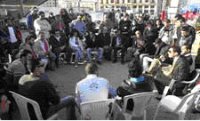
Dialogue circle on national reconciliation and state reconstruction - Moderator: Ziad Majed
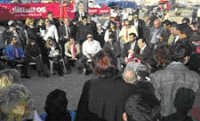
Dialogue circle on media and the responsibility of journalists - Moderator: Ali Hamade
